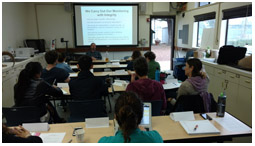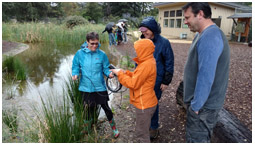
As part of our strategy to better understand the overall health of our local waterways, SBCCC contacted De Anza College seeking their support for an ongoing Water Testing Program. We found a trainer from the State to train the group using the SWAMP Program, and we purchased a water testing device that is currently on loan for students and faculty at De Anza College to collect multiple water samples throughout the year. De Anza’s lead faculty member was a key member of a similar testing program that was launched in the Hollister Area. Beyond gaining valuable knowledge about our local waterways, this program provides students with the opportunity to conduct projects that have a real world application.
 The Water Testing Program began in 2013 to identify the circumstances under which salmon could return to the area. Though he is an avid fisherman, Steve Holmes brought Brian Allée, a 50-year veteran of fisheries specializing in salmon, on board to collect water samples and monitor the salmon spawning season to identify prime habitat for young smolts.
The Water Testing Program began in 2013 to identify the circumstances under which salmon could return to the area. Though he is an avid fisherman, Steve Holmes brought Brian Allée, a 50-year veteran of fisheries specializing in salmon, on board to collect water samples and monitor the salmon spawning season to identify prime habitat for young smolts.
“What you need to do is follow (the salmon) as they migrate upstream,” said Brian Allée to San Jose Mercury reporter. That way, the group could gauge how well the fish spawn and whether or not they survive, especially as streams dry up in the summer and get too warm.
Allée has adopted a sampling regimen that will test water temperature, bacteria count, overall pH levels,  and sediment during the spawning period which helps to determine how likely salmon are to return. To read more about the Water testing project, please link to the presentation given at our April 28, 2018 Townhall Meeting.
and sediment during the spawning period which helps to determine how likely salmon are to return. To read more about the Water testing project, please link to the presentation given at our April 28, 2018 Townhall Meeting.
Fast-forward to 2018 and the spawning activity has been exciting. Read more about the salmon count this year here.